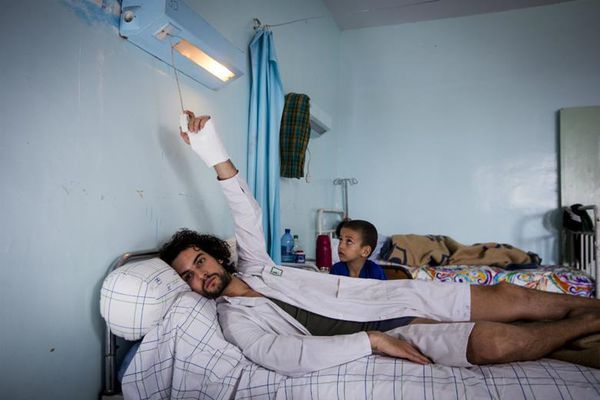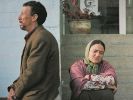Eye For Film >> Movies >> Urgent (2018) Film Review
Urgent
Reviewed by: Amber Wilkinson

Mohcine Besri offers a troubling diagnosis of Morocco's under-pressure medical service in this drama and also suggests that the moral health of humanity in general is hit and miss. Although focused on a struggling hospital in Casablanca, the idea of failing healthcare systems and a society that too often turns a a blind eye to corruption or the problems of others will be familiar to audiences a lot further afield than his homeland. His ability to balance his central drama with more a more darkly comedic tone and hopeful moments also marks it out from many films of this ilk, which all too often become a grim exercise in audience endurance.
Besri, who has a background in maths and physics, constructs his film like a careful equation, introducing us to his human variables via a motorway bridge before travelling with them to the hospital - frequently working all the angles of the frame and a setting to make the drama and comedy work. The opening admirably demonstrates his spatial awareness. On the bridge stands Ali (Ayoub Layoussifi), who has had enough. As he smokes his final cigarette, a man hovers in the background, but he doesn't want to save him - just his cigarettes and clothes. The mordant humour continues when Ali, now in his underwear, flings himself off - with Denis Jutzeler's camera panning heavenwards as he does so rather than tracking his fall - just one of the many counter-intuitive moments in the film that catch the viewer by surprise.

By the time the action moves under the bridge, we discover Ali has had his own trip to paradise postponed after landing in a the middle of a truck of sheep. Cutting away from the confusion, Besri economically introduces us to most of the rest of his characters, stuck in the resultant traffic. Doctor Tariq (Younes Bouab), has returned to the country after studying in Canada, despite protestations from his family, while mum and dad Zahra (Fatma Zahra Banacer) and Driss (Rachid Mustapha) are heading to the hospital to find out what is wrong with their young son Ayoub (Youssef Alaoui). They will soon be joined by Driss' wide boy charmer of a brother Houcine (Saïd Bey), who seems to be in debt to everyone, including his brother, and who will provide Besri's script (co-written with Cécile Vargaftig) plenty of comedy bounce.
At the hospital, everything is in short supply - except corruption. When Ayoub needs a head scan - which should be free under the healthcare system - it turns out the scanner is broken and the family have to stump up cash to have it done privately, which only marks the start of their woes. Ali, who gives up his bed for Ayoub, becomes a sort of silent witness to the hospital's problems and people, as he wanders its crammed corridors. There, he and Tariq discuss their lives, and, in a carefully constructed scene which is staged almost like a 'confessional', with neither character directly looking at the other, he encounters Houcine's long-suffering fiance Najia (Ghalia Benzaouia), who has medical and financial problems of her own.
It's a case of Good Doc/Bad Doc in the hospital, with Tariq doing all he can to help, while the resident surgeon and chief nurse (Zakaria Atifi) are more interested in what money they can make from everyone's misfortune. Besri and Vargaftig neatly weave together the medical drama with more universal themes, in particular, the lengths a parent will go to in order to save their child - lengths that prove both heartbreakingly far while still being realistic.
There's no doubt that an air of suspicion often hangs over home-grown films that appear in festival competitions, the fear being that they have somehow been given less scrutiny than those from other countries. Any concerns in the Marrakech line-up are quickly dispelled here as Besri demonstrates excellent command of his cast and scene construction. Although he shows plenty of chaos, he also allows stillness to offer contrast, so that on more than one occasion he focuses on a silent observer as all hell breaks loose at the edge of the frame. As additional subplots are introduced and Houcine drifts out of the film in favour of the more serious Ali, we miss his puckish presence, but Besri neatly constructs a bridge between the story's beginning and conclusion that, like so much of the film, comes with a dash of the unexpected.
Reviewed on: 09 Dec 2018














